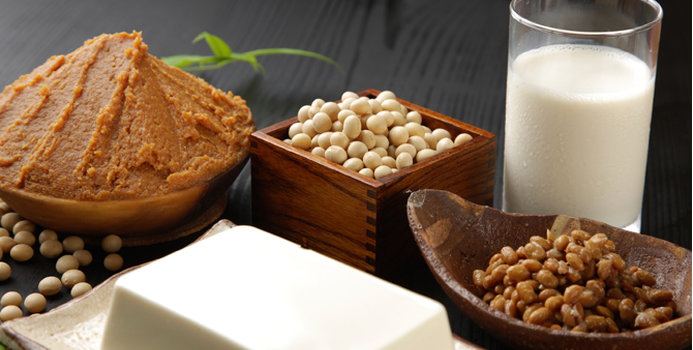Nutrition from soy protein has been much lauded for its beneficial health effects. Proponents of soy protein say that it helps prevent heart disease, breast and other cancers and osteoporosis. Some also believe that soy protein helps improve cognitive ability and memory. While research into many of these areas remains inconclusive, that doesn't mean that soy protein doesn't have nutritional value.
Protein Content of Soy Foods
Soybeans are largely appreciated for their high protein content. Soy protein contains all of the essential amino acids, which means that it's a complete protein. Because of this, soy is an important source of protein for those who rely on meatless diets.
Soybeans contain more protein than other types of beans. About 35% of the calories in soybeans come from protein, while other types of beans offer only 30% of their calories in protein. In terms of quality, soy protein is on par with meat and dairy protein.
Fats in Soy Foods
Most beans and nuts derive between 2% and 14% of their calories from fat. Soybeans derive 40% of their calories from fat. This fat is often used to make soybean cooking oils.
86% of the fat in soybeans is unsaturated, 63% in the form of polyunsaturated fats and 23% in the form of monounsaturated fats. Saturated fats make up 14% of the fat in soybeans. Soybeans contain linolenic acid, an omega-3 fatty acid.
Some soy food products may have some or all of the fat removed. Non-fat and reduced fat soy products may taste different from full-fat soy products. Some people find reduced and non-fat soy products to be less savory. However, these products are ideal for those who require a low fat or fat free diet.
Fiber in Soy Foodsv
All plant foods are high in dietary fiber. One serving of a soy food product that contains whole soybeans, like tempeh, soy flour and textured soy protein, contains about 8 grams of dietary fiber. The fiber in soy protein is 30% soluble.
Some products, like tofu and soy milk, that use only part of the soybean, contain very little fiber. Lower amounts of fiber may affect the texture and taste of the soy product.
Vitamins and Minerals Found in Soy Foods
Soybeans are high in calcium. Processing affects the calcium levels of soy food products, because many manufacturers use calcium compounds as a coagulant (such as in the case of tofu) or they may fortify products like soy milk with calcium. Typically, you can expect to receive between 120 and 300 mg of calcium per serving of a soy food product.
Soybeans are high in iron, but it's hard for your body to absorb. If you'd like to benefit from the high iron content (about 4 mg per serving of cooked soybeans), you should use a Vitamin C supplement, or try fermented soy products like tempeh and miso (these products tend to be slightly sour in taste).
Soybeans are also high in copper, B vitamins, magnesium and zinc.



